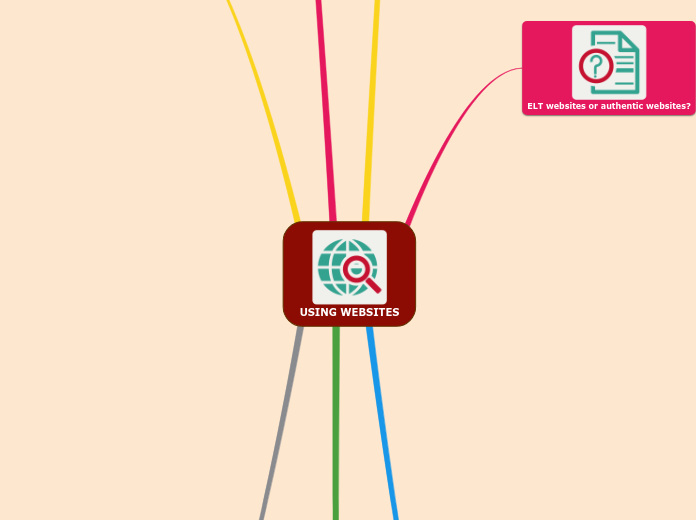
USING WEBSITES

Using websites in the classroom.

Websites.

Internet surfers.

Elt-specific sites.

Monolingual or multilingual sites.

Sites with multimedia.

Web.

Teaching purposes.

Collaboration.

The use of web pages.

Printed pages.

One computer with an Internet connection.

A computer lab.

Internet.

An intrinsic part of the learning process.

Language development.

ELT websites or authentic websites?

Choice of website.

What you want to achieve with it.

Well-designed task.

Authentic sites.

Impact on the learning experience.

ELT websites.

Provide content.

Language practice activities.

Opportunities for language work.

Brush up on certain aspects of the language.

Prepare for an exam.

Authentic sites.

The learners' interests.

Easy structure and navigation.

Make them achievable.

'Total comprehension.'

How to find out useful websites.

For teachers.

Find useful resources.

Speed up lesson planning.

Facilitate web use in class.

For learners.

Accomplish web-based tasks.

Enhance the learning experience.

Search enginees.
Data base of stored information.

Google.

Keywords.

Use the 'phrase.'

Song lyrics.

Word relationship.

Lexical areas.

Subject guides.

Yahoo!

Browsing titles.

Subject guide.

Best reflects users' interests.

Real language searches.

Ask.

Type simple questions.

Activate linguistic and metal processes.

Trivia quiz or short 'treasure hunt.'

Meta search sites.

Search more than one search engine at the same time.

Dogpile.

KartOO.

Mamma.

Web teaching dos and dont's.

Different ways of introducing Internet content.

Don't discount simple text-basedwebsites.

Have a backup in place.

The knowledge of other teachers and learners.

Few web pages.

Try to save them to your computer hard disk.

Work on computers.

Pair work and small group.

Encourage oral communication.

Break down the 'computer as barrier.'

The one computer classroom.

It can be rotated between small groups.

Arrange the computer room.

Maintain control.

The computers around the outside walls of the class.

A central table.

Communicative activities.

Working with lower levels of language profiency.

Websites with simple.

Websites with non-linguistic data.

Easy to interpret.

Weather page.

Websites with visuals.

ELT websites.

Written, edited and prepared for lower levels.

Borrowed words.

Different languages and the words.

KryssTAL.

Warmer.

Ask about any words to students.

Build up a chart.

Web.

The chart opposite by using the website.

Feedback.

Help with any vocabulary problems.

What next.

Work with the language vocabulary.

Brainstorm English words.

Planning lessons using Internet.

Warmer.

The web part of the lesson.

Web.

Computer room.

Print off the web-materials.

What next.

Speaking activity: an interview.

writing activity: 'a day in the life.'

An interview.

A biography.

A lesson plan - Movie stars.

Its intrinsic motivational element.

An upper-intermediate to advanced lesson.

Ask and answer questions.

Explore interview techniques.

Ways of interacting on a social level.

Warmer.

Learners' favorite movie stars.

Web.

The main themes.

How the interview is constructed.

How the interactions were started and developed.

How to evaluate websites.

Accuracy.

Qualifications, experience.

Cross-reference with other similar website.

The linguistic accuracy.

Currency.

Factual information.

Content.

Learners'point of view.

The logic of the links and visual structure.

Functionality.

Check all page.

Check how quickly it loads for learner.
